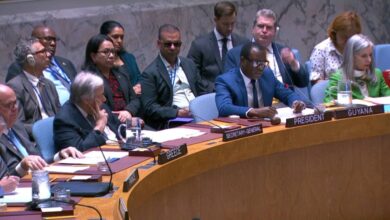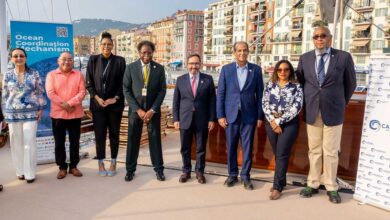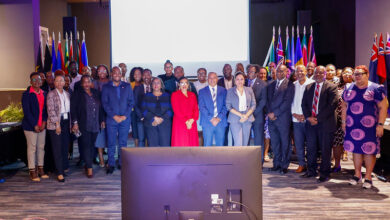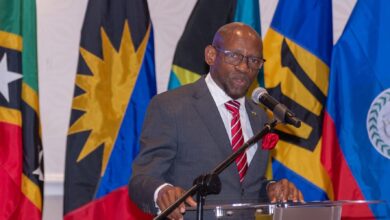(CARICOM Secretariat, Turkeyen, Greater Georgetown, Guyana) The Caribbean Community (CARICOM) is viewing the Third International Meeting on Small Island Developing States (UNSIDS) in Apia, Samoa, 1-4 September, 2014 as an important opportunity to engage the international community on the development challenges facing the Region.
Over the past two years CARICOM Member States have been fully engaged in the processes leading up to the meeting which is being held under the theme “The Sustainable Development of Small Island Developing States through genuine and durable partnerships”. CARICOM is recognised by the international community as the major driver of the SIDS-Programme of Action (SIDS/POA) and this meeting presents an opportunity to seek ways of harmonising the SIDS/POA framework with the strategic development objectives outlined in the Community’s Strategic Plan 2015-2019 recently approved by Heads of Government.
The SIDS/POA had its genesis in the United Nations Conference on Environment and Development (UNCED, 1992) where it was recognized that SIDS share unique characteristics that make them economically, environmentally and socially vulnerable to shocks over which they exercise little or no control, placing them at a distinct disadvantage in comparison with larger countries. The SIDS/POA was adopted at the first UNSIDS which was held in Barbados in 1994 and defined various challenges that SIDS face in their efforts to achieve sustainable economic growth and development.
This Programme of Action was reshaped at the International Review Meeting in Mauritius in January 2005 and highlighted the need to accelerate efforts to assist small island states in building resilience to environmental, social and economic vulnerabilities. The Strategy adopted addressed new and emerging issues, including the impact of HIV/AIDS, security concerns, the importance of information and communication technology, the need for special and differential treatment in the face of erosion of trade preferences, and the protection of indigenous culture and cultural industries.
Since 1994, much action has been taken by CARICOM (SIDS) towards their sustainable development using most of their own available resources to implement the SIDS/POA with limited assistance from international development partners. Many sustainable development initiatives, programmes and projects have been instituted at the regional and national levels. At the regional level, major initiatives include:
• Establishment of the Caribbean Community Climate change Centre
• Cleaner Production Project
• Integrating Watershed and Coastal area Management in Small Island Developing States of the Caribbean (IWCAM)
• The Eastern Caribbean Waste Management Project
• Caribbean Global Water Partnership
• Caribbean Regional Fisheries Mechanism (CRFM)
These projects have benefitted from funding from the Global Environment Facility (GEF), the World Bank, the United Nations Development Programme (UNDP), the United Nations Environmental Programme (UNEP), the European Union, and the Canadian International Development Agency (CIDA), among others.
There have also been attempts to garner the support of the international community towards capacity building, institutional strengthening and networking in a number of other areas including Information and Communication Technology and the development and use of renewable energy.
However, the financial and economic crisis of 2008 has led to significant decline in the global, regional and national investment, trade, incomes, employment, consumption, and wealth along with features such as the credit crunch, and the food and energy crises. CARICOM economies have been hit very hard. Economic growth, tourist arrivals, and foreign direct investments have declined, fiscal positions have deteriorated, and the levels of debt have increased in a number of CARICOM Member States, which has led to high levels of unemployment and the adoption of austerity policy measures across the Region. The meeting therefore provides another opportunity for the Region to press the international community on the issue of using per capita income criteria to determine access to concessionary development financing.
Against that background, CARICOM Member States will be seeking to ensure that the new SIDS /POA to be determined in Samoa, reflects their development aspirations and embraces a broader understanding of the conditions of SIDS. This is critical as the Samoa gathering is the last major opportunity for small states to consolidate their issues as the negotiations draw to a close on the United Nations Post 2015 Development Agenda.
Given the theme of the Meeting, the Community welcomes the opportunity to develop partnerships with the international community, since these are of strategic importance for small, open economies like ours, if we are to succeed in our poverty alleviation and sustainable development efforts. Innovative partnerships can be an effective mechanism to facilitate the scaling up of best practices and in implementing global commitments.
The Region’s strategy has been geared towards building on and expanding areas in which there is already some level of ongoing activities, demonstrated interest and institutional capacity. This approach of building synergies, filling gaps and utilizing existing national and regional institutions should optimize the effectiveness of any new financial resources, strengthen capacity, reduce lead time and increase the sustainability of activities that would improve the lives of the people of the Community.
Editor’s Note:
SIDS (Small Island Developing States) are recognised as a ‘special case’ in the United Nations forum because of several characteristics which make them especially vulnerable to external shocks including; their small sizes, extreme isolation, limited and narrow resource bases, geographic dispersion and isolation from markets, diseconomies of scale, capacity limitations, and susceptibility to climate change, natural disasters and global crises. Currently, thirty-nine SIDS and twelve territories are included in the list used by the United Nations Department of Economic and Social Affairs in monitoring the sustainable development of SIDS. These countries are often categorised by their three regions; the AIMS (Africa, Indian Ocean, Mediterranean and South China Sea), the Caribbean, and the Pacific. These SIDS work together in the United Nations through the Alliance of Small Island States (AOSIS)
The United Nations Post-2015 Development Agenda will help define the global development framework after 2015 when the focus shifts from the UN Millennium Development Goals (MDGs) – the eight development goals set at the UN Millennium Summit in 2000. A High Level Panel of Eminent Persons, appointed by the UN Secretary General in 2012, is leading the thrust towards advancing this development agenda post 2015.





